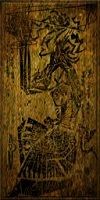Gnomey wrote:To your first point, while it's true that Urshilaku is pretty much the only tribe that believes in that stuff, there's specifically a set of quests where you convince the Ashkhans of the other tribes -- who seem not to share the beliefs of the Urshilaku -- to support you as Nerevarine anyway. For me, the question of whether you'll need to get the support of the other tribes and Houses is really a question of pacing by this point; having the player visit something like ten tribes and five Houses might be too large of an interruption of the plotflow, so we may need to get a little creative if we want the Nerevarine to really drum up universal support.
Good point. And I'm not sure. I think in order for the pacing to work, we'd have to put in more plot points during the time the player is running around getting Nerevarine and Hortator votes, or it'd just feel like one epic fetch quest. Things like...a city is overrun by Sixth House cultists. Or one of the guys that was really gung ho about you being the Nerevarine is exposed to be a Sixth House cultist. Or Holamayon (spelling) is discovered. Or you get captured and interrogated by the Temple. Or even something involving a conversation with Dagoth Ur himself, explaining that side of the story more. Stuff like that.
Aaaaand while that all could be really dang cool to include, it's probably a bit far out of the scope of TR to alter the main questline that much.
On slaves: I thought the Ashlanders always say that they used to own slaves, but realized they were more trouble than they were worth, or something to that effect. The reality of the matter is probably that the Ashlanders have become so dirt-poor that supporting slaves would cost them more than they would be able to get back through slave-labour. In fact, as hunting, gathering and herding don't really seem like ideal tasks for slaves, any slaves they used to have probably either did stuff around the camp, which anyone too old or young to forage or herd could do, or essentially act as household slaves, who in hard times would make for rather expensive and irritating ornaments.
Ah, that makes sense. Perhaps for use in one of the Ashlander tribes that managed to maintain its wealth through trade. Do we have themes for the new Ashlander tribes yet?
Ashlander in-fighting: in western Morrowind, the camps are too far apart to fight with each other, though my concept for one of the camps is that it's basically formed from the remnants of defunct tribes which were probably often on bad terms, and that consequently there would be a lot of tension within the camp. If we do have more Ashlanders in Telvannis, the idea does seem like it could work there. Conflicts with outcasts always work, of course.
Imperial encroachment: not sure how big a deal this would actually be on the mainland, where the Imperials have less room to encroach on than on Vvardenfell. Those themes could work just as well for House Hlaalu, though, which has been eating up and settling a lot of land.
Both good points. I think the Hlaalu idea would work well, particularly if we're in need of more content for Hlaalu, too.

